SandboxTry
Editor-In-Chief: C. Michael Gibson, M.S., M.D. [1]; Associate Editor(s)-in-Chief: Ahmed Zaghw, M.D. [2]
Synonyms / Brand Names: xxxxxx®
Disclaimer
WikiDoc Drug Project is a constellation of drug information for healthcare providers and patients vigorously vetted on the basis of FDA package insert, MedlinePlus, Practice Guidelines, Scientific Statements, and scholarly medical literature. The information provided is not a medical advice or treatment. WikiDoc does not promote any medication or off-label use of drugs. Please read our full disclaimer here.
Black Box Warning
|
WARNING: DISCONTINUING PRADAXA IN PATIENTS WITHOUT ADEQUATE CONTINUOUS ANTICOAGULATION INCREASES RISK OF STROKE See full prescribing information for complete boxed warning. Discontinuing PRADAXA places patients at an increased risk of thrombotic events. If anticoagulation with PRADAXA must be discontinued for a reason other than pathological bleeding, consider coverage with another anticoagulant. |
Overview
SandboxTry is an angiotensin converting enzyme inhibitor drug that is FDA approved for the treatment of hypertension. There is a Black Box Warning for this drug as shown here. Common adverse reactions include cough, dizziness, fatigue, and headache.
Adult Indications and Dosage
FDA-Labeled Indications and Dosage (Adult)
Hypertension
- Dosing Information
- Initial dose (not receiving a diuretic): xxxxxx
- Initial dose (concurrent xxxxxx use): xxxxxx (see Warnings). If blood pressure is not controlled with xxxxxx alone, diuretic should be resumed and xxxxxx 5 mg PO qd should be used.
- Maintenance dose: xxxxxx 20—40 mg PO qd or xxxxxx 10—20 mg PO bid (MAX 80 mg/day)
- xxxxxx.
- xxxxxx.
- xxxxxx.
For Hypertensive Patients with Renal Impairment
- Dosing Information
- Initial dose (for creatinine clearance <30 mL/min/1.73 m2 or Cr >3 mg/dL): xxxxxx 5 mg PO qd
- Dosage may be titrated upward until blood pressure is controlled or to a maximum total daily dose of 40 mg (see Warnings).[1]
Off-Label Use and Dosage (Adult)
Guideline-Supported Use
Heart Failure, Stage B
- Developed by: American College of Cardiology (ACC) and American Heart Association (AHA)
- Class of Recommendation: Class I
- Level of Evidence: Level A
- Recommendation
- xxxxxx
Myocardial Infarction
- Developed by: American College of Cardiology (ACC) and American Heart Association (AHA)
- Class of Recommendation: Class I
- Level of Evidence: Level A
- Recommendation
- An angiotensin-converting enzyme (ACE) inhibitor should be administered within the first 24 hours to all patients with STEMI with anterior location, HF, or ejection fraction (EF) less than or equal to 0.40, unless contraindicated.[2]
Non–Guideline-Supported Use
Diabetic Nephropathy
- Dosing Information
Kidney Disease, Non-Diabetic
- Dosing Information
Left Ventricular Hypertrophy
- Dosing Information
- xxxxxx 20 mg PO qd for 2 weeks, followed by xxxxxx 40 mg qd or combination of xxxxxx 40 mg PO qd and Amlodipine 5 mg PO qd[5]
Pediatric Indications and Dosage
FDA-Labeled Indications and Dosage (Pediatric)
Hypertension
- Dosing Information
- Initial dose: xxxxxx 0.2 mg/kg PO qd (for pediatric patients above the age of 6 years)
- xxxxxx is not advised for children below the age of 6 years (see Pediatric Use) and in pediatric patients with glomerular filtration rate <30 mL.
- For pediatric patients who cannot swallow tablets, or for whom the calculated dosage (mg/kg) does not correspond to the available tablet strengths for xxxxxx, follow the suspension preparation instructions to administer xxxxxx HCl as a suspension (see Administration and Monitoring).
Hypertensive Patients with Renal Impairment
- Dosing Information
- Initial dose (for creatinine clearance <30 mL/min/1.73 m2 or Cr >3 mg/dL): xxxxxx 5 mg PO qd
- Dosage may be titrated upward until blood pressure is controlled or to a maximum total daily dose of 40 mg (see Warnings).
Off-Label Use and Dosage (Pediatric)
There is limited information about Off-Label Use and Dosage of xxxxxx tablet in pediatric patients.
Contraindications
- Hypersensitivity to xxxxxx or to any other ACE inhibitor
- History of angioedema with or without previous ACE inhibitor treatment
Warnings
Anaphylactoid and Possibly Related Reactions
- Presumably because angiotensin-converting enzyme inhibitors affect the metabolism of eicosanoids and polypeptides, including endogenous bradykinin, patients receiving ACE inhibitors (including xxxxxx) may be subject to a variety of adverse reactions, some of them serious.
- Head and Neck Angioedema
- Angioedema of the face, extremities, lips, tongue, glottis, and larynx has been reported in patients treated with angiotensin-converting enzyme inhibitors. In U.S. clinical trials, symptoms consistent with angioedema were seen in none of the subjects who received placebo and in about 0.5% of the subjects who received xxxxxx. Angioedema associated with laryngeal edema can be fatal. If laryngeal stridor or angioedema of the face, tongue, or glottis occurs, treatment with xxxxxx should be discontinued and appropriate therapy instituted immediately. Where there is involvement of the tongue, glottis, or larynx, likely to cause airway obstruction, appropriate therapy, e.g., subcutaneous epinephrine injection 1:1000 (0.3 mL to 0.5 mL) should be promptly administered (see Adverse Reactions).
- Black patients receiving ACE inhibitors have been reported to have a higher incidence of angioedema compared to nonblacks.
- Intestinal Angioedema
- Intestinal angioedema has been reported in patients treated with ACE inhibitors. These patients presented with abdominal pain (with or without nausea or vomiting); in some cases there was no prior history of facial angioedema and C-1 esterase levels were normal. The angioedema was diagnosed by procedures including abdominal CT scan or ultrasound, or at surgery, and symptoms resolved after stopping the ACE inhibitor. Intestinal angioedema should be included in the differential diagnosis of patients on ACE inhibitors presenting with abdominal pain.
- Anaphylactoid Reactions During Desensitization
- Two patients undergoing desensitizing treatment with hymenoptera venom while receiving ACE inhibitors sustained life-threatening anaphylactoid reactions. In the same patients, these reactions were avoided when ACE inhibitors were temporarily withheld, but they reappeared upon inadvertent rechallenge.
- Anaphylactoid Reactions During Membrane Exposure
- Anaphylactoid reactions have been reported in patients dialyzed with high-flux membranes and treated concomitantly with an ACE inhibitor. Anaphylactoid reactions have also been reported in patients undergoing low-density lipoprotein apheresis with dextran sulfate absorption (a procedure dependent upon devices not approved in the United States).
Hypotension
- xxxxxx can cause symptomatic hypotension. Like other ACE inhibitors, xxxxxx has been only rarely associated with hypotension in uncomplicated hypertensive patients. Symptomatic hypotension is most likely to occur in patients who have been volume-and/or salt-depleted as a result of prolonged diuretic therapy, dietary salt restriction, dialysis, diarrhea, or vomiting. Volume-and/or salt-depletion should be corrected before initiating therapy with xxxxxx.
- In patients with congestive heart failure, with or without associated renal insufficiency, ACE inhibitor therapy may cause excessive hypotension, which may be associated with oliguria or azotemia and, rarely, with acute renal failure and death. In such patients, xxxxxx therapy should be started under close medical supervision; they should be followed closely for the first 2 weeks of treatment and whenever the dose of xxxxxx or diuretic is increased.
- If hypotension occurs, the patient should be placed in a supine position, and, if necessary, treated with intravenous infusion of physiological saline. xxxxxx treatment usually can be continued following restoration of blood pressure and volume.
Fetal toxicity
- Use of drugs that act on the renin-angiotensin system during the second and third trimesters of pregnancy reduces fetal renal function and increases fetal and neonatal morbidity and death. Resulting oligohydramnios can be associated with fetal lung hypoplasia and skeletal deformations. Potential neonatal adverse effects include skull hypoplasia, anuria, hypotension, renal failure, and death. When pregnancy is detected, discontinue xxxxxx as soon as possible. These adverse outcomes are usually associated with use of these drugs in the second and third trimester of pregnancy. Most epidemiologic studies examining fetal abnormalities after exposure to antihypertensive use in the first trimester have not distinguished drugs affecting the renin-angiotensin system from other antihypertensive agents. Appropriate management of maternal hypertension during pregnancy is important to optimize outcomes for both mother and fetus.
- In the unusual case that there is no appropriate alternative to therapy with drugs affecting the renin-angiotensin system for a particular patient, apprise the mother of the potential risk to the fetus. Perform serial ultrasound examinations to assess the intra-amniotic environment. If oligohydramnios is observed, discontinue xxxxxx, unless it is considered lifesaving for the mother. Fetal testing may be appropriate, based on the week of pregnancy. Patients and physicians should be aware, however, that oligohydramnios may not appear until after the fetus has sustained irreversible injury. Closely observe infants with histories of in utero exposure to xxxxxx for hypotension, oliguria, and hyperkalemia (see Pediatric Use).
- No teratogenic effects of xxxxxx were seen in studies of pregnant rats, mice, and rabbits. On a mg/m2 basis, the doses used in these studies were 60 times (in rats), 9 times (in mice), and more than 0.8 times (in rabbits) the maximum recommended human dose (assuming a 50-kg woman). On a mg/kg basis these multiples are 300 times (in rats), 90 times (in mice), and more than 3 times (in rabbits) the maximum recommended human dose.
Hepatic Failure
- Rarely, ACE inhibitors have been associated with a syndrome that starts with cholestatic jaundice and progresses to fulminant hepatic necrosis and (sometimes) death. The mechanism of this syndrome is not understood. Patients receiving ACE inhibitors who develop jaundice or marked elevations of hepatic enzymes should discontinue the ACE inhibitor and receive appropriate medical follow-up.
Adverse Reactions
Clinical Trials Experience
- xxxxxx has been evaluated for safety in over 6000 patients with hypertension; over 700 of these patients were treated for at least one year. The overall incidence of reported adverse events was comparable in xxxxxx and placebo patients.
- The reported side effects were generally mild and transient, and there was no relation between side effects and age, duration of therapy, or total dosage within the range of 2 to 80 mg. Discontinuation of therapy because of a side effect was required in approximately 5% of U.S. patients treated with xxxxxx and in 3% of patients treated with placebo.
- The side effects considered possibly or probably related to study drug that occurred in U.S. placebo-controlled trials in more than 1% of patients treated with xxxxxx are shown below.
- Other adverse experiences reported in controlled clinical trials (in less than 1% of xxxxxx patients or with less than 1% difference in incidence between xxxxxx or placebo treatment), and rarer events seen in post-marketing experience, include the following (in some, a causal relationship to drug use is uncertain):
- Dermatologic
- Stevens-Johnson syndrome, pemphigus, apparent hypersensitivity reactions (manifested by dermatitis, pruritus, or rash), photosensitivity, and flushing.
- Gastrointestinal
- Nausea, pancreatitis, constipation, gastritis, vomiting, and melena.
- Hematologic
- Neurologic and Psychiatric
- Other
- Another potentially important adverse experience, eosinophilic pneumonitis, has been attributed to other ACE inhibitors.
- Clinical Laboratory Test Findings
- Hemoglobin
- Decreases in hemoglobin (a low value and a decrease of 5 g/dL) were rare, occurring in only 1 of 2,014 patients receiving xxxxxx alone and in 1 of 1,357 patients receiving xxxxxx plus a diuretic. No U.S. patients discontinued treatment because of decreases in hemoglobin.
- Other (causal relationships unknown)
- Elevations of uric acid, blood glucose, serum bilirubin, and liver enzymes (see Warnings) have been reported, as have scattered incidents of hyponatremia, electrocardiographic changes, eosinophilia, and proteinuria.
- Pediatric Patients
- The adverse experience profile for pediatric patients appears to be similar to that seen in adult patients.
Postmarketing Experience
FDA Package Insert for SandboxTry contains no information regarding Postmarketing Experience.
Drug Interactions
- Patients on diuretics, especially those in whom diuretic therapy was recently instituted, may occasionally experience an excessive reduction of blood pressure after initiation of therapy with xxxxxx. The possibility of hypotensive effects with xxxxxx can be minimized by either discontinuing the diuretic or increasing the salt intake prior to initiation of treatment with xxxxxx. If this is not possible, the starting dose should be reduced (see Adult Indications and Dosage).
- Potassium supplements and potassium-sparing diuretics
- Oral anticoagulants
- Interaction studies with warfarin and acenocoumarol failed to identify any clinically important effects on the serum concentrations or clinical effects of these anticoagulants.
- Increased serum lithium levels and symptoms of lithium toxicity have been reported in patients receiving ACE inhibitors (including xxxxxx) during therapy with lithium. Monitor lithium levels when used concomitantly with xxxxxx.
- Nitritoid reactions (symptoms include facial flushing, nausea, vomiting and hypotension) have been reported rarely in patients on therapy with injectable gold (sodium aurothiomalate) and concomitant ACE inhibitor therapy.
- Anti-diabetics
- In rare cases, diabetic patients receiving an ACE inhibitor (including xxxxxx) concomitantly with insulin or oral anti-diabetics may develop hypoglycemia. Such patients should therefore be advised about the possibility of hypoglycemic reactions and should be monitored accordingly.
- Non-steroidal anti-inflammatory drugs (NSAIDs) including selective cyclooxygenase-2 inhibitors (COX-2 inhibitors)
- In patients who are elderly, volume-depleted (including those on diuretic therapy), or with compromised renal function, co-administration of NSAIDs, including selective COX-2 inhibitors, with ACE inhibitors, including xxxxxx, may result in deterioration of renal function, including possible acute renal failure. These effects are usually reversible. Monitor renal function periodically in patients receiving xxxxxx and NSAID therapy.
- The antihypertensive effect of ACE inhibitors, including xxxxxx, may be attenuated by NSAIDs.
- Miscellaneous
- xxxxxx has been used concomitantly with beta-adrenergic-blocking agents, calcium-channel-blocking agents, diuretics, digoxin, and hydralazine, without evidence of clinically important adverse interactions. xxxxxx, like other ACE inhibitors, has had less than additive effects with beta-adrenergic blockers, presumably because both drugs lower blood pressure by inhibiting parts of the renin-angiotensin system.
- The pharmacokinetics of xxxxxx are not affected by the following drugs: hydrochlorothiazide, furosemide, chlorthalidone, digoxin, propranolol, atenolol, nifedipine, amlodipine, naproxen, acetylsalicylic acid, or cimetidine. Likewise the administration of xxxxxx does not substantially affect the pharmacokinetics of these medications (cimetidine kinetics were not studied).
Use in Specific Populations
Pregnancy
Pregnancy Category (FDA): D
Pregnancy Category (AUS): SandboxTry is not included in Australian Drug Evaluation Committee (ADEC) Pregnancy Categories.
- Fetal toxicity
- Use of drugs that act on the renin-angiotensin system during the second and third trimesters of pregnancy reduces fetal renal function and increases fetal and neonatal morbidity and death. Resulting oligohydramnios can be associated with fetal lung hypoplasia and skeletal deformations. Potential neonatal adverse effects include skull hypoplasia, anuria, hypotension, renal failure, and death. When pregnancy is detected, discontinue xxxxxx as soon as possible. These adverse outcomes are usually associated with use of these drugs in the second and third trimester of pregnancy. Most epidemiologic studies examining fetal abnormalities after exposure to antihypertensive use in the first trimester have not distinguished drugs affecting the renin-angiotensin system from other antihypertensive agents. Appropriate management of maternal hypertension during pregnancy is important to optimize outcomes for both mother and fetus.
- In the unusual case that there is no appropriate alternative to therapy with drugs affecting the renin-angiotensin system for a particular patient, apprise the mother of the potential risk to the fetus. Perform serial ultrasound examinations to assess the intra-amniotic environment. If oligohydramnios is observed, discontinue xxxxxx, unless it is considered lifesaving for the mother. Fetal testing may be appropriate, based on the week of pregnancy. Patients and physicians should be aware, however, that oligohydramnios may not appear until after the fetus has sustained irreversible injury. Closely observe infants with histories of in utero exposure to xxxxxx for hypotension, oliguria, and hyperkalemia (see Pediatric Use).
- No teratogenic effects of xxxxxx were seen in studies of pregnant rats, mice, and rabbits. On a mg/m2 basis, the doses used in these studies were 60 times (in rats), 9 times (in mice), and more than 0.8 times (in rabbits) the maximum recommended human dose (assuming a 50-kg woman). On a mg/kg basis these multiples are 300 times (in rats), 90 times (in mice), and more than 3 times (in rabbits) the maximum recommended human dose.
Labor and Delivery
FDA Package Insert for SandboxTry contains no information regarding Labor and Delivery.
Nursing Mothers
- Minimal amounts of unchanged xxxxxx and of xxxxxxat are excreted into the breast milk of lactating women treated with xxxxxx. A newborn child ingesting entirely breast milk would receive less than 0.1% of the mg/kg maternal dose of xxxxxx and xxxxxxat.
Pediatric Use
- Neonates with a history of in utero exposure to xxxxxx
- If oliguria or hypotension occurs, direct attention toward support of blood pressure and renal perfusion. Exchange transfusions or dialysis may be required as a means of reversing hypotension and/or substituting for disordered renal function. xxxxxx, which crosses the placenta, can theoretically be removed from the neonatal circulation by these means; there are occasional reports of benefit from these maneuvers with another ACE inhibitor, but experience is limited.
- The antihypertensive effects of xxxxxx have been evaluated in a double-blind study in pediatric patients 7 to 16 years of age (see Pharmacodynamics). The pharmacokinetics of xxxxxx have been evaluated in pediatric patients 6 to 16 years of age (see Pharmacokinetics) . xxxxxx was generally well tolerated and adverse effects were similar to those described in adults. (See Adverse Reactions). The long-term effects of xxxxxx on growth and development have not been studied. Infants below the age of 1 year should not be given xxxxxx because of the risk of effects on kidney development.
- Treatment with xxxxxx is not recommended in pediatric patients less than 6 years of age (see Adverse Reactions), and in children with glomerular filtration rate <30 mL/min as there are insufficient data available to support a dosing recommendation in these groups. (See Pharmacokinetics.)
Geriatric Use
- Of the total number of patients who received xxxxxx in U.S. clinical studies of xxxxxx, 18% were 65 or older while 2% were 75 or older. No overall differences in effectiveness or safety were observed between these patients and younger patients, and other reported clinical experience has not identified differences in responses between the elderly and younger patients, but greater sensitivity of some older individuals cannot be ruled out.
- xxxxxx and xxxxxxat are substantially excreted by the kidney. Because elderly patients are more likely to have decreased renal function, care should be taken in dose selection, and it may be useful to monitor renal function.
Gender
FDA Package Insert for SandboxTry contains no information regarding Gender.
Race
FDA Package Insert for SandboxTry contains no information regarding Race.
Renal Impairment
- As a consequence of inhibiting the renin-angiotensin-aldosterone system, changes in renal function may be anticipated in susceptible individuals. In patients with severe congestive heart failure whose renal function may depend on the activity of the renin-angiotensin-aldosterone system, treatment with angiotensin-converting enzyme inhibitors, including xxxxxx, may be associated with oliguria and/or progressive azotemia and (rarely) with acute renal failure and/or death. In a small study of hypertensive patients with renal artery stenosis in a solitary kidney or bilateral renal artery stenosis, treatment with xxxxxx was associated with increases in blood urea nitrogen and serum creatinine; these increases were reversible upon discontinuation of xxxxxx or diuretic therapy, or both. When such patients are treated with ACE inhibitors, renal function should be monitored during the first few weeks of therapy. Some hypertensive patients with no apparent preexisting renal vascular disease have developed increases in blood urea nitrogen and serum creatinine, usually minor and transient, especially when xxxxxx has been given concomitantly with a diuretic. This is more likely to occur in patients with preexisting renal impairment. Dosage reduction of xxxxxx and/or discontinuation of the diuretic may be required. Evaluation of the hypertensive patient should always include assessment of renal function (see Adult Indications and Dosage).
Hepatic Impairment
- Rarely, ACE inhibitors have been associated with a syndrome that starts with cholestatic jaundice and progresses to fulminant hepatic necrosis and (sometimes) death. The mechanism of this syndrome is not understood. Patients receiving ACE inhibitors who develop jaundice or marked elevations of hepatic enzymes should discontinue the ACE inhibitor and receive appropriate medical follow-up.
Carcinogenesis, Mutagenesis, Impairment of Fertility
- No evidence of carcinogenicity was found when xxxxxx was administered to rats and mice for up to two years at doses of up to 150 mg/kg/day. When compared on the basis of body weights, this dose is 110 times the maximum recommended human dose. When compared on the basis of body surface areas, this dose is 18 and 9 times (rats and mice, respectively) the maximum recommended human dose (calculations assume a patient weight of 60 kg).
- No mutagenic activity was detected in the Ames test in bacteria (with or without metabolic activation), in an in vitro test for forward mutations in cultured mammalian cells, or in a nucleus anomaly test.
- In doses of 50-500 mg/kg/day (6-60 times the maximum recommended human dose based on mg/m2 comparison and 37-375 times the maximum recommended human dose based on a mg/kg comparison), xxxxxx had no adverse effect on the reproductive performance of male and female rats.
Immunocompromised Patients
FDA Package Insert for SandboxTry contains no information regarding Immunocompromised Patients.
Miscellaneous
- Hyperkalemia
- In clinical trials, hyperkalemia (serum potassium at least 0.5 mEq/L greater than the upper limit of normal) occurred in approximately 1% of hypertensive patients receiving xxxxxx. In most cases, these were isolated values which resolved despite continued therapy. Risk factors for the development of hyperkalemia include renal insufficiency, diabetes mellitus, and the concomitant use of potassium-sparing diuretics, potassium supplements, and/or potassium-containing salt substitutes, which should be used cautiously, if at all, with xxxxxx (see Drug Interactions).
- Cough
- Presumably due to the inhibition of the degradation of endogenous bradykinin, persistent nonproductive cough has been reported with all ACE inhibitors, always resolving after discontinuation of therapy. ACE inhibitor-induced cough should be considered in the differential diagnosis of cough.
- Surgery/Anesthesia
- In patients undergoing surgery or during anesthesia with agents that produce hypotension, xxxxxx will block the angiotensin II formation that could otherwise occur secondary to compensatory renin release. Hypotension that occurs as a result of this mechanism can be corrected by volume expansion.
Administration and Monitoring
Administration
- Oral
- Preparation of suspension (for 150 mL of a 2 mg/mL suspension)
- Add 75 mL of Ora-Plus® oral suspending vehicle to an amber polyethylene terephthalate (PET) bottle containing fifteen xxxxxx 20 mg tablets, and shake for at least 2 minutes. Allow the suspension to stand for a minimum of 1 hour. After the standing time, shake the suspension for a minimum of 1 additional minute. Add 75 mL of Ora-Sweet® oral syrup vehicle to the bottle and shake the suspension to disperse the ingredients. The suspension should be refrigerated at 2-8°C (36-46°F) and can be stored for up to 30 days in the PET bottle with a child-resistant screw-cap closure. Shake the suspension before each use.
Monitoring
- Geriatric Use
- xxxxxx and xxxxxxat are substantially excreted by the kidney. Because elderly patients are more likely to have decreased renal function, care should be taken in dose selection, and it may be useful to monitor renal function.
- Overdose
- Patients should be closely monitored for blood pressure and clinical symptoms. Supportive management should be employed to ensure adequate hydration and to maintain systemic blood pressure.
- Renal Artery Stenosis
- When hypertensive patients with renal artery stenosis in a solitary kidney or bilateral renal artery stenosis patients are treated with ACE inhibitors, renal function should be monitored during the first few weeks of therapy.
- Use of Potassium Supplements and Potassium-Sparing Diuretics
- Concomitant potassium supplements and potassium-sparing diuretics use with xxxxxx may effect potassium levels. Monitor potassium periodically.
- Use of Lithium
- Increased serum lithium levels and symptoms of lithium toxicity have been reported in patients receiving ACE inhibitors (including xxxxxx) during therapy with lithium. Monitor lithium levels when used concomitantly with xxxxxx.
- Use of Anti-Diabetics
- In rare cases, diabetic patients receiving an ACE inhibitor (including xxxxxx) concomitantly with insulin or oral anti-diabetics may develop hypoglycemia. Such patients should therefore be advised about the possibility of hypoglycemic reactions and should be monitored accordingly.
- Use of Non-Steroidal Anti-Inflammatory Drugs (NSAIDs) Including Selective Cyclooxygenase-2 Inhibitors (COX-2 Inhibitors)
- In patients who are elderly, volume-depleted (including those on diuretic therapy), or with compromised renal function, co-administration of NSAIDs, including selective COX-2 inhibitors, with ACE inhibitors, including xxxxxx, may result in deterioration of renal function, including possible acute renal failure. These effects are usually reversible. Monitor renal function periodically in patients receiving xxxxxx and NSAID therapy.
IV Compatibility
FDA Package Insert for SandboxTry contains no information regarding IV Compatibility.
Overdosage
Acute Overdose
Signs and Symptoms
- Human overdoses of xxxxxx have not been reported, but the most common manifestation of human xxxxxx overdosage is likely to be hypotension, which can be associated with electrolyte disturbances and renal failure.
Management
- Laboratory determinations of serum levels of xxxxxx and its metabolites are not widely available, and such determinations have, in any event, no established role in the management of xxxxxx overdose.
- No data are available to suggest physiological maneuvers (e.g., maneuvers to change the pH of the urine) that might accelerate elimination of xxxxxx and its metabolites. xxxxxx is only slightly dialyzable, but dialysis might be considered in overdosed patients with severely impaired renal function (see Warnings).
- Angiotensin II could presumably serve as a specific antagonist-antidote in the setting of xxxxxx overdose, but angiotensin II is essentially unavailable outside of scattered research facilities. Because the hypotensive effect of xxxxxx is achieved through vasodilation and effective hypovolemia, it is reasonable to treat xxxxxx overdose by infusion of normal saline solution.
- If ingestion is recent, activated charcoal should be considered. Gastric decontamination (e.g., vomiting, gastric lavage) may be considered in individual cases, in the early period after ingestion.
- Patients should be closely monitored for blood pressure and clinical symptoms. Supportive management should be employed to ensure adequate hydration and to maintain systemic blood pressure.
- In the case of marked hypotension, physiological saline solution should be administered intravenously; depending on the clinical situation the use of vasopressors (e.g., catecholamines i.v.) may be considered.
Chronic Overdose
Signs and Symptoms
FDA Package Insert for SandboxTry contains no information regarding Signs and Symptoms in Chronic Overdose.
Management
FDA Package Insert for SandboxTry contains no information regarding Management in Chronic Overdose.
Pharmacology
Mechanism of Action
- xxxxxx and xxxxxxat inhibit angiotensin-converting enzyme (ACE) in human subjects and animals. ACE is a peptidyl dipeptidase that catalyzes the conversion of angiotensin I to the vasoconstrictor substance, angiotensin II. Angiotensin II also stimulates aldosterone secretion by the adrenal cortex.
- Inhibition of ACE results in decreased plasma angiotensin II, which leads to decreased vasopressor activity and to decreased aldosterone secretion. The latter decrease may result in a small increase of serum potassium. Hypertensive patients treated with xxxxxx alone for up to 52 weeks had elevations of serum potassium of up to 0.2 mEq/L. Similar patients treated with xxxxxx and hydrochlorothiazide for up to 24 weeks had no consistent changes in their serum potassium.
- Removal of angiotensin II negative feedback on renin secretion leads to increased plasma renin activity. In animal studies, xxxxxx had no inhibitory effect on the vasopressor response to angiotensin II and did not interfere with the hemodynamic effects of the autonomic neurotransmitters acetylcholine, epinephrine, and norepinephrine.
- ACE is identical to kininase, an enzyme that degrades bradykinin. Whether increased levels of bradykinin, a potent vasodepressor peptide, play a role in the therapeutic effects of xxxxxx remains to be elucidated.
- While the mechanism through which xxxxxx lowers blood pressure is believed to be primarily suppression of the renin-angiotensin-aldosterone system, xxxxxx has an antihypertensive effect even in patients with low-renin hypertension (see Adult Indications and Dosage).
Structure
| Template:Px | |
SandboxTry
| |
| Systematic (IUPAC) name | |
| 2-[(3S)-3-{[(2S)-1-ethoxy-1-oxo-4-phenylbutan-2-yl]amino}- | |
| Identifiers | |
| CAS number | |
| ATC code | C09 |
| PubChem | |
| DrugBank | |
| Chemical data | |
| Formula | Template:OrganicBox atomTemplate:OrganicBox atomTemplate:OrganicBoxTemplate:OrganicBoxTemplate:OrganicBoxTemplate:OrganicBoxTemplate:OrganicBoxTemplate:OrganicBoxTemplate:OrganicBoxTemplate:OrganicBoxTemplate:OrganicBoxTemplate:OrganicBoxTemplate:OrganicBoxTemplate:OrganicBox atomTemplate:OrganicBoxTemplate:OrganicBox atomTemplate:OrganicBoxTemplate:OrganicBoxTemplate:OrganicBoxTemplate:OrganicBoxTemplate:OrganicBoxTemplate:OrganicBoxTemplate:OrganicBox |
| Mol. mass | 424.49 g/mol |
| SMILES | & |
| Pharmacokinetic data | |
| Bioavailability | ? |
| Protein binding | 96.7% |
| Metabolism | Hepatic glucuronidation |
| Half life | 10-11 hours |
| Excretion | Renal and biliary |
| Therapeutic considerations | |
| Pregnancy cat. |
D |
| Legal status |
Template:Unicode Prescription only |
| Routes | Oral |
- xxxxxx hydrochloride is a white to off-white crystalline powder, soluble (>100 mg/mL) in water, in ethanol, and in methanol. Its chemical name is xxxxxx 3-[[1-(ethoxy-carbonyl)-3-phenyl-(1S)-propyl]amino]-2,3,4,5-tetrahydro-2-oxo-1H-1-(3S)-benzazepine-1-acetic acid monohydrochloride.
- Its empirical formula is C24H28N2O5•HCl, and its molecular weight is 460.96.
- xxxxxxat, the active metabolite of xxxxxx, is a non-sulfhydryl angiotensin-converting enzyme inhibitor. xxxxxx is converted to xxxxxxat by hepatic cleavage of the ester group.
- xxxxxx is supplied as tablets containing 5 mg, 10 mg, 20 mg, and 40 mg of xxxxxx hydrochloride for oral administration. The inactive ingredients are colloidal silicon dioxide, crospovidone, hydrogenated castor oil (5-mg, 10-mg, and 20-mg tablets), hypromellose, iron oxides, lactose, magnesium stearate (40-mg tablets), microcrystalline cellulose, polysorbate 80, propylene glycol (5-mg and 40-mg tablets), starch, talc, and titanium dioxide.
Pharmacodynamics
- Single and multiple doses of 10 mg or more of xxxxxx cause inhibition of plasma ACE activity by at least 80%-90% for at least 24 hours after dosing. Pressor responses to exogenous angiotensin I were inhibited by 60%-90% (up to 4 hours post-dose) at the 10-mg dose.
Pharmacokinetics
- Following oral administration of xxxxxx, peak plasma concentrations of xxxxxx are reached within 0.5-1.0 hours. The extent of absorption is at least 37% as determined by urinary recovery and is not significantly influenced by the presence of food in the GI tract.
- Cleavage of the ester group (primarily in the liver) converts xxxxxx to its active metabolite, xxxxxxat. Peak plasma concentrations of xxxxxxat are reached 1-2 hours after drug intake in the fasting state and 2-4 hours after drug intake in the nonfasting state. The serum protein binding of xxxxxx is about 96.7% and that of xxxxxxat about 95.3%, as measured by equilibrium dialysis; on the basis of in vitro studies, the degree of protein binding should be unaffected by age, hepatic dysfunction, or concentration (over the concentration range of 0.24-23.6 µmol/L).
- xxxxxx is almost completely metabolized to xxxxxxat, which has much greater ACE inhibitory activity than xxxxxx, and to the glucuronide conjugates of xxxxxx and xxxxxxat. Only trace amounts of an administered dose of xxxxxx can be recovered in the urine as unchanged xxxxxx, while about 20% of the dose is excreted as xxxxxxat, 4% as xxxxxx glucuronide, and 8% as xxxxxxat glucuronide.
- The kinetics of xxxxxx are approximately dose-proportional within the dosage range of 10-80 mg.
- In adults, the effective half-life of accumulation of xxxxxxat following multiple dosing of xxxxxx hydrochloride is 10-11 hours. Thus, steady-state concentrations of xxxxxxat should be reached after 2 or 3 doses of xxxxxx hydrochloride given once daily.
- The kinetics did not change, and there was no significant accumulation during chronic administration (28 days) of once-daily doses between 5 mg and 20 mg. Accumulation ratios based on AUC and urinary recovery of xxxxxxat were 1.19 and 1.27, respectively.
- xxxxxx and xxxxxxat are cleared predominantly by renal excretion in healthy subjects with normal renal function. Nonrenal (i.e., biliary) excretion accounts for approximately 11%-12% of xxxxxxat excretion in healthy subjects. In patients with renal failure, biliary clearance may compensate to an extent for deficient renal clearance.
- In patients with renal insufficiency, the disposition of xxxxxx and xxxxxxat in patients with mild-to-moderate renal insufficiency (creatinine clearance >30 mL/min) is similar to that in patients with normal renal function. In patients with creatinine clearance <30 mL/min, peak xxxxxxat levels and the initial (alpha phase) half-life increase, and time to steady state may be delayed (see Adult Indications and Dosage).
- When dialysis was started 2 hours after ingestion of 10 mg of xxxxxx, approximately 6% of xxxxxxat was removed in 4 hours of dialysis. The parent compound, xxxxxx, was not detected in the dialysate.
- In patients with hepatic insufficiency (due to cirrhosis), the pharmacokinetics of xxxxxxat are essentially unaltered. The pharmacokinetics of xxxxxx and xxxxxxat do not appear to be influenced by age.
- In pediatric patients, (N=45) hypertensive, age 6 to 16 years, given multiple daily doses of xxxxxx (0.1 to 0.5 mg/kg), the clearance of xxxxxxat for children 6 to 12 years old was 0.35 L/hr/kg, more than twice that of healthy adults receiving a single dose of 10 mg (0.13 L/hr/kg). In adolescents, it was 0.17 L/hr/kg, 27% higher than that of healthy adults. The terminal elimination half-life of xxxxxxat in pediatric patients was around 5 hours, one-third that observed in adults.
Nonclinical Toxicology
FDA Package Insert for SandboxTry contains no information regarding Nonclinical Toxicology.
Clinical Studies
Hypertension
Adult
- xxxxxxx.
- xxxxxxx.
- xxxxxx.
- xxxxxx.
- xxxxxx.
Pediatric
- In a clinical study of 107 pediatric patients, 7 to 16 years of age, with either systolic or diastolic pressure above the 95th percentile, patients were given 0.1 or 0.2 mg/kg then titrated up to 0.3 or 0.6 mg/kg with a maximum dose of 40 mg once daily. After four weeks of treatment, the 85 patients whose blood pressure was reduced on therapy were then randomized to either placebo or xxxxxx and were followed up for an additional two weeks. At the end of two weeks, blood pressure (both systolic and diastolic) in children withdrawn to placebo rose by 4 to 6 mmHg more than in children on xxxxxx. No dose-response was observed for the three doses.
How Supplied
- xxxxxx is available in tablets of 5 mg, 10 mg, 20 mg, and 40 mg, packaged with a desiccant in bottles of 100 tablets.
- Each tablet is imprinted with xxxxxx on one side and the tablet strength (“5,” “10,” “20,” or “40”) on the other.
- National Drug Code (NDC):
- Storage
- Do not store above 30°C (86°F). Protect from moisture. Dispense in tight container (USP).
- Manufactured by
- Novartis Pharmaceuticals Corporation, Suffern, New York 10901
- Distributed by
- Novartis Pharmaceuticals Corporation, East Hanover, New Jersey 07936
Images
Drug Images
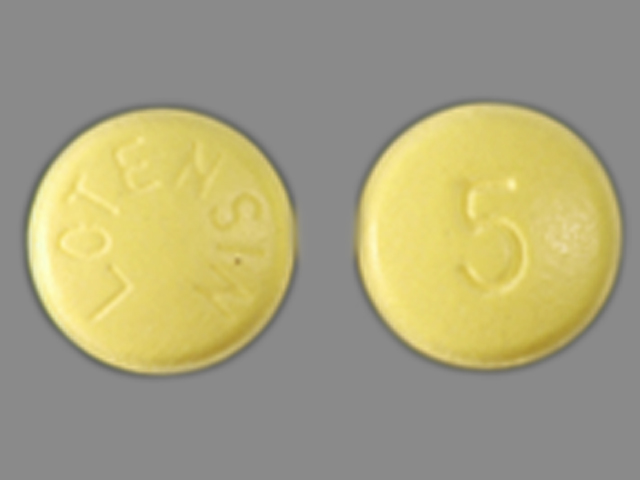 Drug Name: Lotensin 5 MG Oral Tablet |
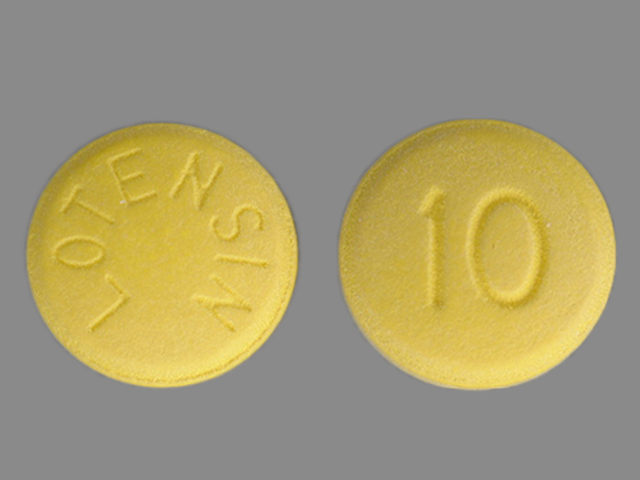 Drug Name: Lotensin 10 MG Oral Tablet |
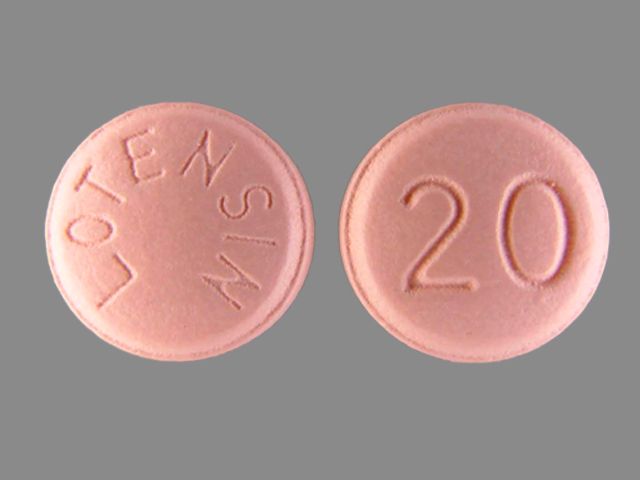 Drug Name: Lotensin 20 MG Oral Tablet |
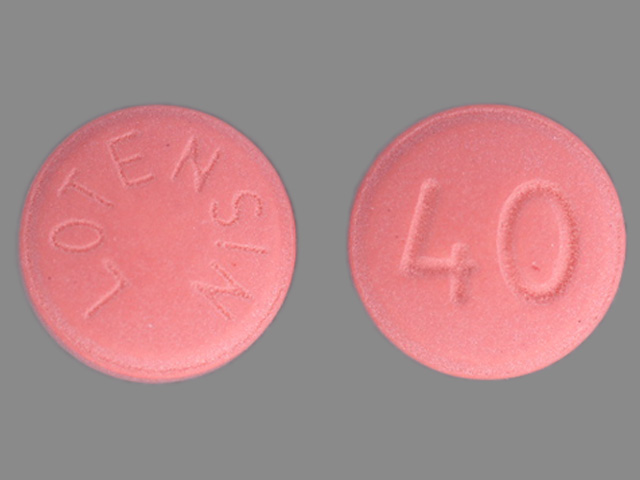 Drug Name: Lotensin 40 MG Oral Tablet |
Package and Label Display Panel
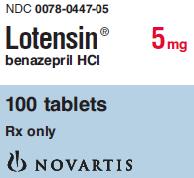 |
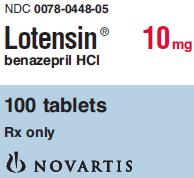 |
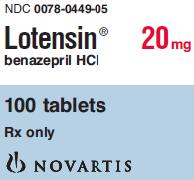 |
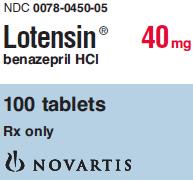 |
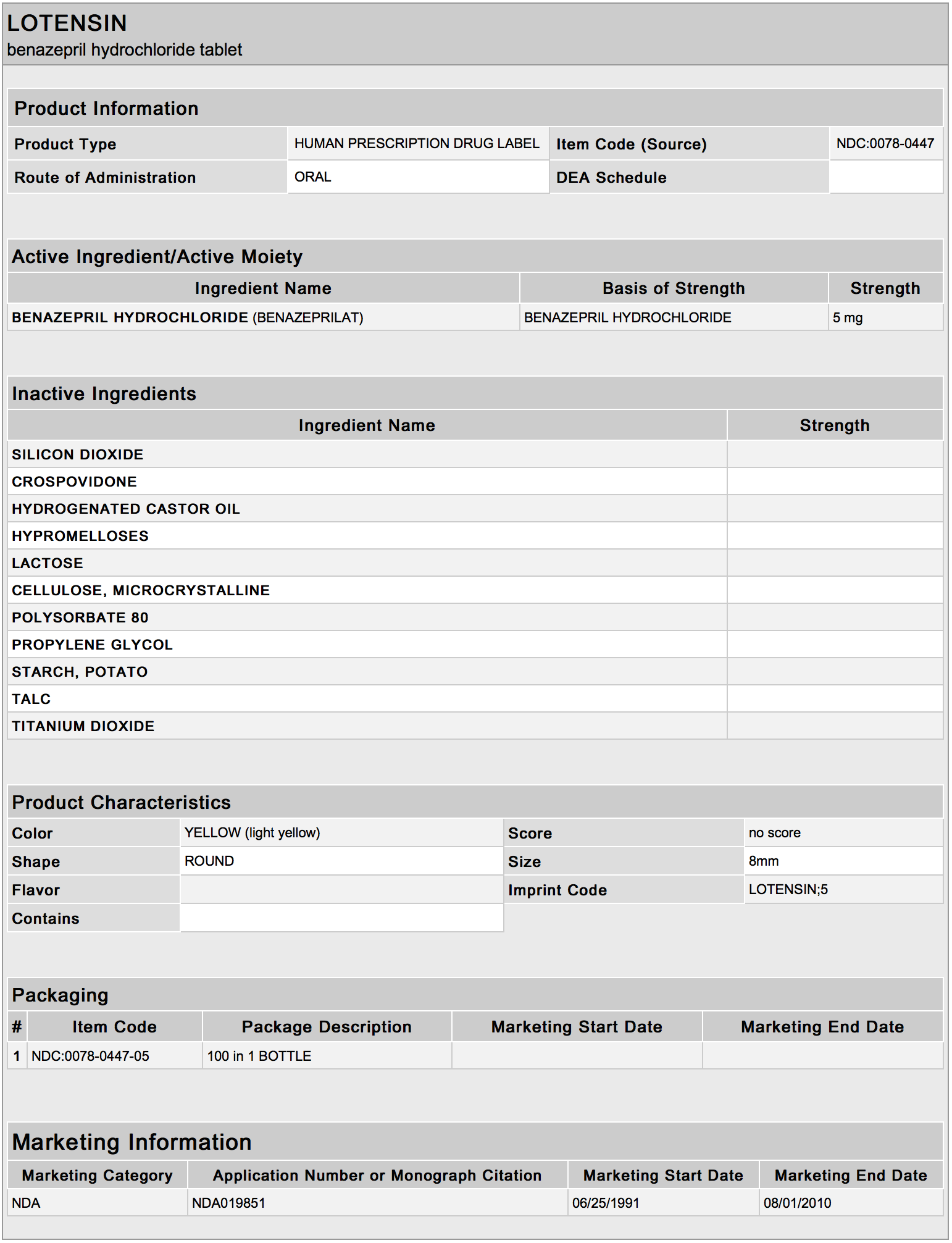 |
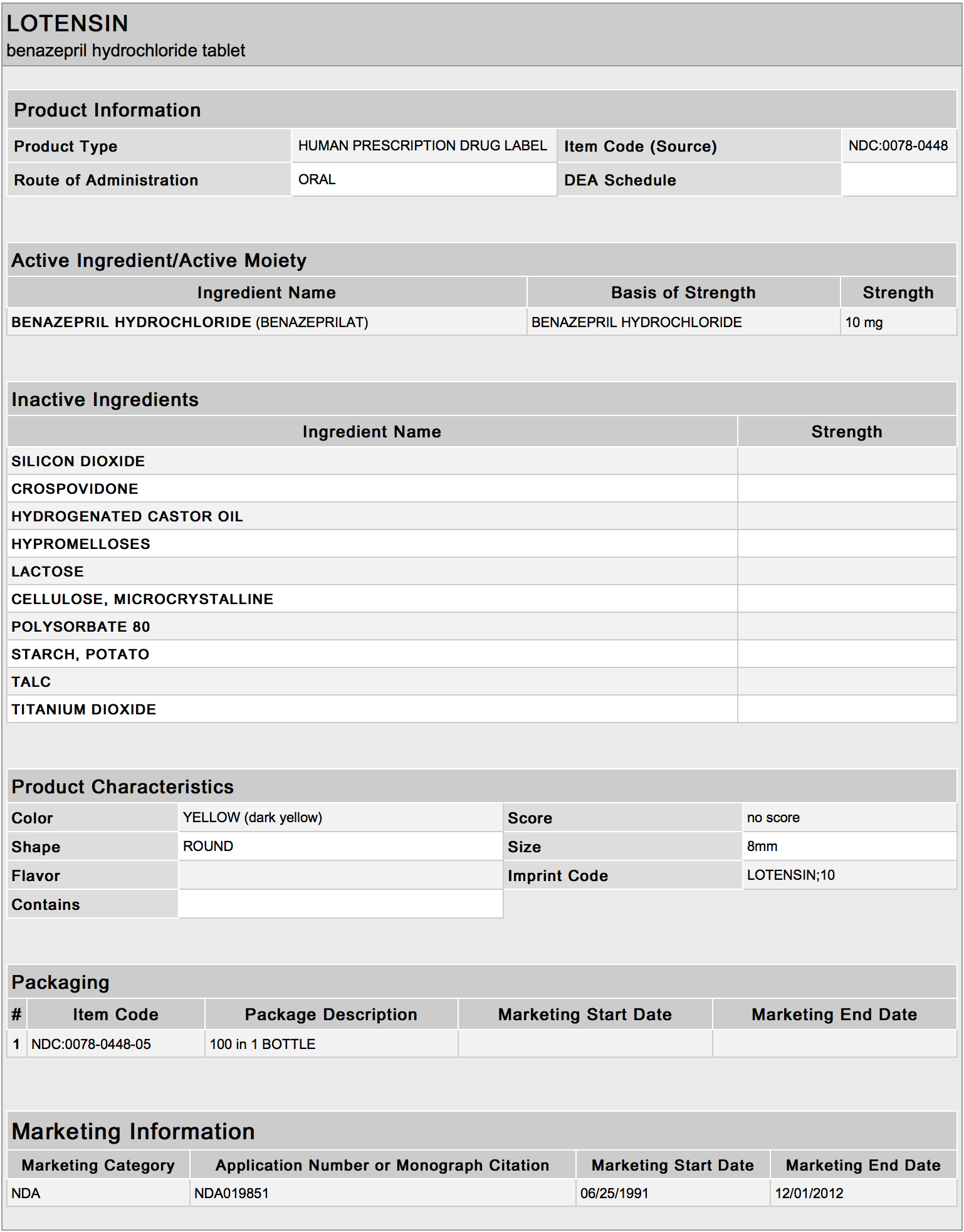 |
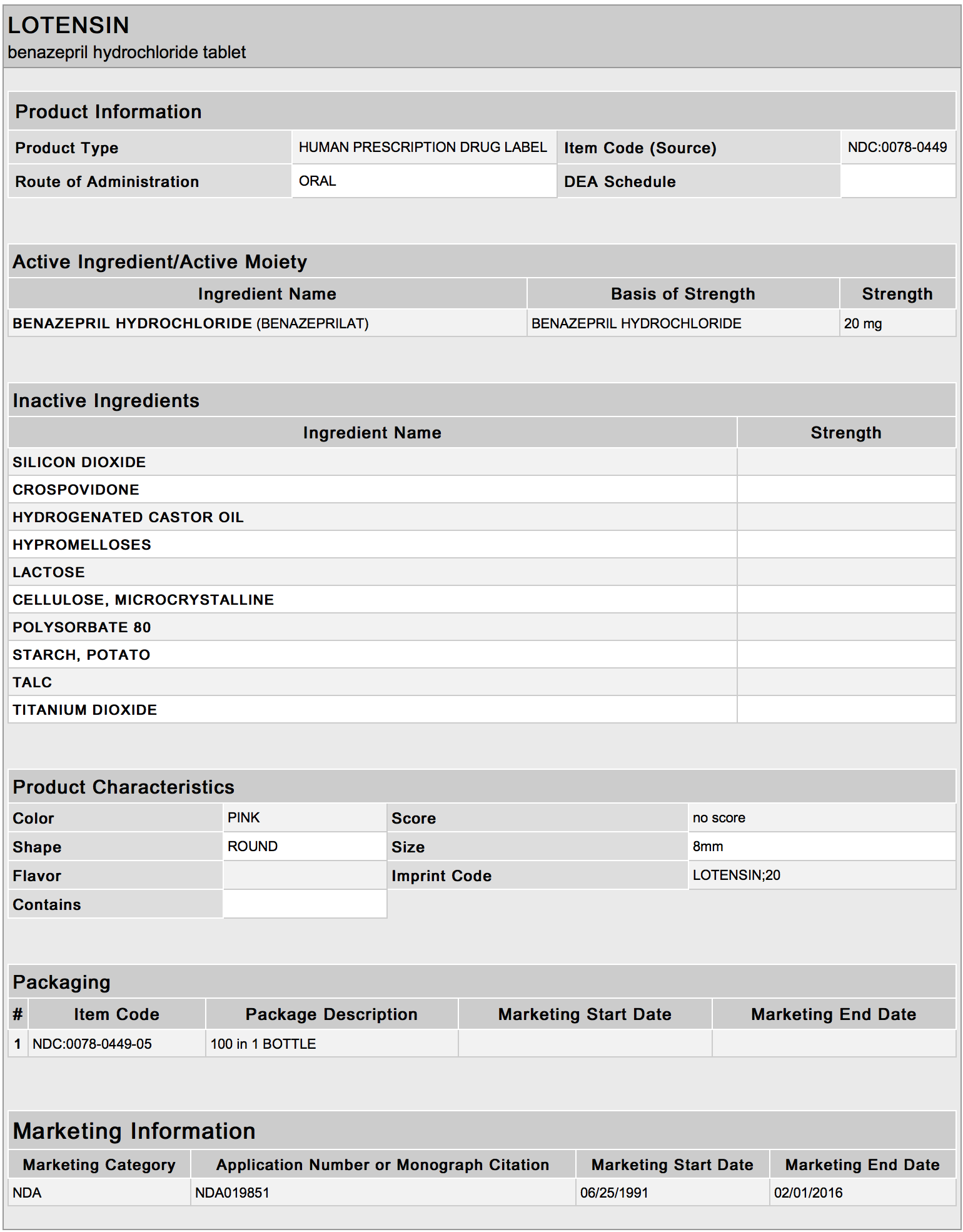 |
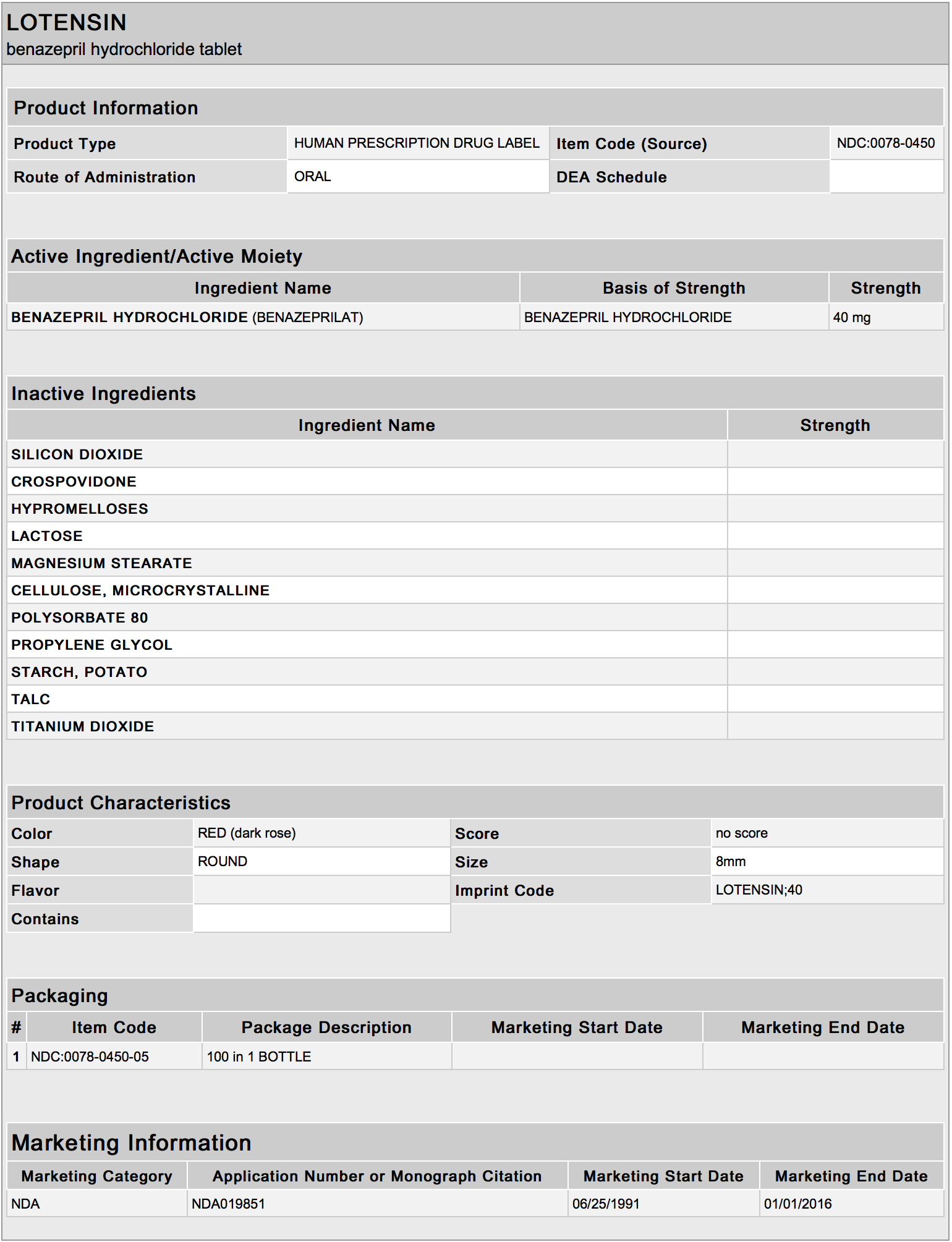 |
Patient Information
Patient Information from FDA
- Pregnancy
- Female patients of childbearing age should be told about the consequences of exposure to xxxxxx during pregnancy. Discuss treatment options with women planning to become pregnant. Patients should be asked to report pregnancies to their physicians as soon as possible.
- Angioedema
- Angioedema, including laryngeal edema, can occur at any time with treatment with ACE inhibitors. Patients should be so advised and told to report immediately any signs or symptoms suggesting angioedema (swelling of face, eyes, lips, or tongue, or difficulty in breathing) and to take no more drug until they have consulted with the prescribing physician.
- Symptomatic Hypotension
- Patients should be cautioned that lightheadedness can occur, especially during the first days of therapy, and it should be reported to the prescribing physician. Patients should be told that if syncope occurs, xxxxxx should be discontinued until the prescribing physician has been consulted.
- All patients should be cautioned that inadequate fluid intake or excessive perspiration, diarrhea, or vomiting can lead to an excessive fall in blood pressure, with the same consequences of lightheadedness and possible syncope.
- Hyperkalemia
- Neutropenia
- Patients should be told to promptly report any indication of infection (e.g., sore throat, fever), which could be a sign of neutropenia.
Patient Information from NLM
For patient information about xxxxxx from NLM, click here.
Precautions with Alcohol
Alcohol-SandboxTry interaction has not been established. Talk to your doctor about the effects of taking alcohol with this medication.
Brand Names
Lotensin®
Look-Alike Drug Names
xxxxxx — xxxxxx®
xxxxxx® — xxxxxxx®, xxxxxx®, Lovastatin
Drug Shortage Status
Price
References
- ↑ "LOTENSIN (xxxxxx HYDROCHLORIDE) TABLET [NOVARTIS PHARMACEUTICALS CORPORATION]".
- ↑ O'Gara, PT.; Kushner, FG.; Ascheim, DD.; Casey, DE.; Chung, MK.; de Lemos, JA.; Ettinger, SM.; Fang, JC.; Fesmire, FM. (2013). "2013 ACCF/AHA guideline for the management of ST-elevation myocardial infarction: a report of the American College of Cardiology Foundation/American Heart Association Task Force on Practice Guidelines". Circulation. 127 (4): e362–425. doi:10.1161/CIR.0b013e3182742cf6. PMID 23247304. Unknown parameter
|month=ignored (help) - ↑ 3.0 3.1 Maschio, G.; Alberti, D.; Locatelli, F.; Mann, JF.; Motolese, M.; Ponticelli, C.; Ritz, E.; Janin, G.; Zucchelli, P. (1999). "Angiotensin-converting enzyme inhibitors and kidney protection: the AIPRI trial. The ACE Inhibition in Progressive Renal Insufficiency (AIPRI) Study Group". J Cardiovasc Pharmacol. 33 Suppl 1: S16–20, discussion S41-3. PMID 10028949.
- ↑ 4.0 4.1 Maschio, G.; Alberti, D.; Janin, G.; Locatelli, F.; Mann, JF.; Motolese, M.; Ponticelli, C.; Ritz, E.; Zucchelli, P. (1996). "Effect of the angiotensin-converting-enzyme inhibitor xxxxxx on the progression of chronic renal insufficiency. The Angiotensin-Converting-Enzyme Inhibition in Progressive Renal Insufficiency Study Group". N Engl J Med. 334 (15): 939–45. doi:10.1056/NEJM199604113341502. PMID 8596594. Unknown parameter
|month=ignored (help) - ↑ Neutel, JM.; Smith, DH.; Weber, MA. (2004). "Effect of antihypertensive monotherapy and combination therapy on arterial distensibility and left ventricular mass". Am J Hypertens. 17 (1): 37–42. PMID 14700510. Unknown parameter
|month=ignored (help)